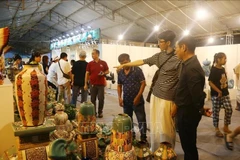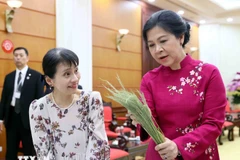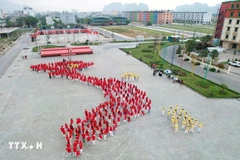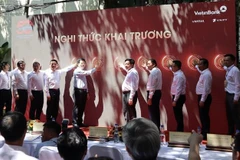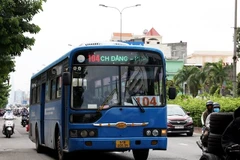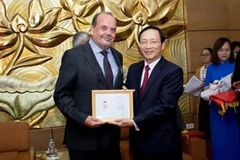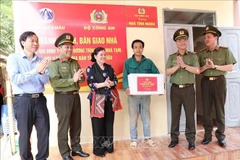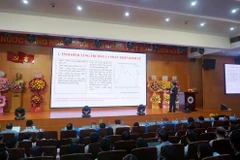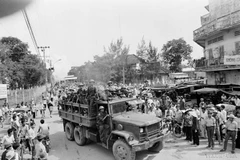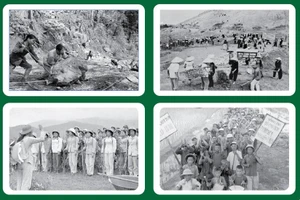However, the naturalcharacteristics of the area with many rivers has posed many difficultiesfor the process of building new rural areas, said the Vietnam BusinessForum.
At the preliminary conference on three years ofimplementation of national target programme on building new rural areasin the Mekong Delta region held by the Steering Committee of nationaltarget programme on building new rural areas in Hau Giang on 25thFebruary, many creative ways of mobilising people and power to build newrural area were put forward.
According to the Ministry ofAgriculture and Rural Development, in the past 3 years, the Mekong Deltahas mobilised about 121,340 billion VND from different financialresources to build new rural areas. In particular, the budget capital,credit capital, corporate capital and community capital account for31.2, 47.3, 4.3 and 17.2 percent, respectively.
Thereby, by theend of 2013, averagely, communes in the Mekong Delta reached 9.23criteria, increasing by 3.19 compared to 2011 (8.36 criteria reachedaveragely, an increase of 3 criteria).
Compared to 2011, theprovinces and cities in the Mekong Delta have increased criteria ratecompared to that of the whole country (averagely more than 3 criteria);no communes fail to reach criteria of new rural area. This has shown theefforts of the committees, the governments and the people in the MekongDelta despite difficult conditions.
However, there are still 62communes reaching less than 5 criteria, which are located in theprovinces of Tien Giang (39 communes), Ben Tre (7 communes), Ca Mau (10communes), etc. This requires further efforts of the governments andpeople of these communes. Besides, the inspection and evaluation ofperformance of criteria in a number of localities has not been fullypaid attention to, subjective and tends to chase movement.
FormerMinister of Agriculture and Rural Development (MARD) Le Huy Ngo, mentorof the national target programme on building new rural areas noted thatthe construction of new rural area should focus on improving life ofthe people. When life of the people gets better, advocating for theremaining criteria will get easier.
Capital for infrastructure isthe most difficult thing in the process of building new rural areas.According to calculation, averagely each commune needs investment rateof 300 billion VND to reach 19 criteria of new rural communes.Meanwhile, the current capital of 1 billion VND per commune is toolittle, said Vice Chairman of the People’s Committee of Long Anprovince Nguyen Thanh Nguyen.
The Mekong Delta is divided bymany waterways and canals while the soil remains soft. Educational levelis still low, while economic structure is still largely based onagriculture which is not highly effective. There is still lack ofinfrastructure, especially that of transport, irrigation, electricityand clean water. The life of a part of the population, especially ethnicminorities, remains low and is frequently affected by floods. Those arethe impacts which are slowing the progress in implementing the buildingof new rural area in the Mekong Delta.
There were proposalsthat there should be distinguished criteria for building new rural areain the Mekong Delta. There are also comments warning that criteria forbuilding new rural area shouldn’t be pursued rigidly. It was importantto understand that the construction of new rural area is changing thelives of the people in the direction of shortening the gap between richand poor and creating conditions for people in the countryside to enjoythe life.
"People know, people discuss, people contribute, sothat the construction of new rural area will be more efficient," saidPham Van Quynh, Director of the Department of Agriculture and RuralDevelopment of Can Tho city. The fact is that the construction of newrural area will get high quality and save more if local people join.
TranHoang Duyen, District Party Committee Secretary of Phuong Long, BacLieu province shared that people are quite indifferent to works managedby contractor only. When local people get involved in the constructionas a partner, they would enthusiastically contribute their thoughts andhuman capital to the work. For example, a project on the construction ofrural roads, if managed by contractor only, is estimated to cost 26billion VND but will only cost 13 billion VND if the people andofficials of those localities take part in. Besides, the quality ofconstruction is very high.
"I wish new rural areas in the MekongDelta could get high competitiveness," said Le Huy Ngo, former Ministerof MARD. In fact, a lot of localities are still trying to figure outways to increase income for people in the context of limitedagricultural output and fragmented production models. Therefore,restructuring agricultural labour in rural areas is vital to increasepeople’s participation in building new rural areas.
Manysuggested that the criteria be divided into "hard" and "soft" in theprocess of building new rural area. However, former Minister of MARD LeHuy Ngo said that this should be carefully taken into consideration:"Any criterion has to meet the satisfaction of people. The satisfactionlevel of the people should be considered a measure for the process ofbuilding new rural areas."
According to Le Huy Ngo, in theprocess of building new rural areas, the characteristics of the MekongDelta people, who are spontaneous, generous, close to nature and willingto share with the community, should be noted.
According tothe MARD, the Mekong Delta has so far 18 communes which reach 19criteria, equivalent to 1.4 percent (1.2 percent in the whole country),the number of communes which reach 15-18 criteria is 4.7 percent (5.7percent in the whole country), the number of communes which reach 10-14criteria was 36 percent (28.9 percent in the whole country), the numberof communes which reach 5-9 criteria is 53 percent (47.2 percent in thewhole country), the number of communes achieving less than 5 criteria is62, equivalent to 4.9 percent (17.3 percent in the whole country) .
Addressingthe conclusion of the conference, Minister of Agriculture and RuralDevelopment Cao Duc Phat emphasised: "The most important thing is togain the trust of the people. The golden principle is democracy,openness and transparency in the process of building new rural areas.Localities have to be dynamic, creative and have appropriate steps andtake satisfaction of the people as a measure in the process of buildingnew rural areas.”-VNA




